
Lykke Li’s “Gunshot” is off her upcoming album, I Never Learn,” out May 5, 2014.
This is a very cool song. Can’t wait for the album.
Here are the lyrics:
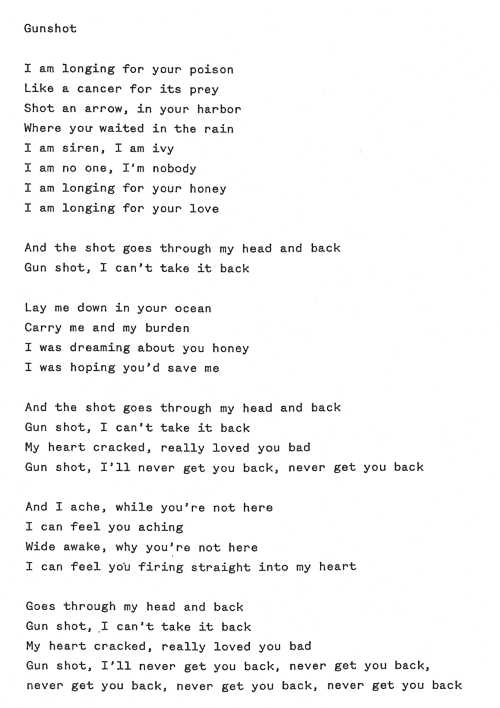
Listen here
-– A Days of the Crazy-Wild blog post: sounds, visuals and/or news –

Lykke Li’s “Gunshot” is off her upcoming album, I Never Learn,” out May 5, 2014.
This is a very cool song. Can’t wait for the album.
Here are the lyrics:

Listen here
-– A Days of the Crazy-Wild blog post: sounds, visuals and/or news –
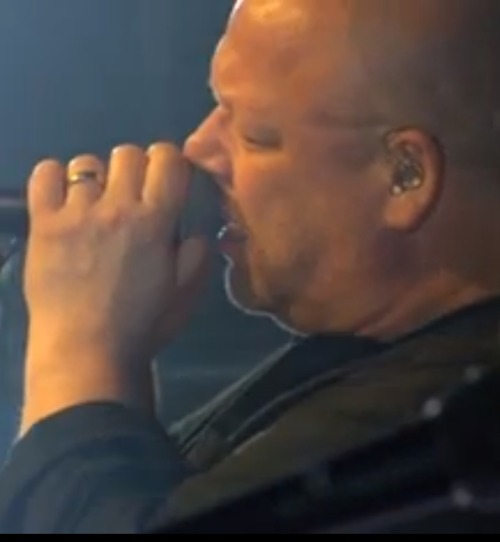
The Pixies took the stage at Coachella yesterday (April 12, 2014).
Yours for the viewing.
Setlist:
1. “Bone Machine”
2. “Wave of Mutilation”
3. “Head On”
4. “Gouge Away”
5. “Bagboy”
6. “Caribou”
7. “U-Mass”
8. “Crackity Jones”
9. “Magdalena 318″
10. “Where Is My Mind?”
11. “Nimrod’s Son”
12. “Indie Cindy”
13. “Ed Is Dead”
14. “Greens and Blues”
15. “Vamos”
-– A Days of the Crazy-Wild blog post: sounds, visuals and/or news –

The Hold Steady played The Met in Pawtucket, Rhode Island last night (April 12, 2014).
They sound terrific.
“Little Hoodrat Friend”:
“Magazines”:
“Banging Camp”:
“Chips Ahoy”:

Bob Dylan and John Lennon, very stoned, talking in the back of a cab in 1966. What’s amazing about this is that here we’ve got two of the greatest rock music minds of the 20th century and what should be a momentous occasion is, well, not much different than any two guys, stoned, talking about nothing.
This is from Dylan’s film, “Eat the Document.”
This version is tinted blue.
This version is just audio but it goes on for almost three more minutes.
-– A Days of the Crazy-Wild blog post: sounds, visuals and/or news –

Fantastic article in today’s Sunday New York Times on the search for 1930s blues singers ‘Geeshie Wiley’ and ‘Elvie’ Thomas.
Below the excerpt are the songs the two women recorded in 1930 for Paramount Records.
John Jeremiah Sullivan writes:
IN THE WORLD of early-20th-century African-American music and people obsessed by it, who can appear from one angle like a clique of pale and misanthropic scholar-gatherers and from another like a sizable chunk of the human population, there exist no ghosts more vexing than a couple of women identified on three ultrarare records made in 1930 and ’31 as Elvie Thomas and Geeshie Wiley. There are musicians as obscure as Wiley and Thomas, and musicians as great, but in none does the Venn diagram of greatness and lostness reveal such vast and bewildering co-extent. In the spring of 1930, in a damp and dimly lit studio, in a small Wisconsin village on the western shore of Lake Michigan, the duo recorded a batch of songs that for more than half a century have been numbered among the masterpieces of prewar American music, in particular two, Elvie’s “Motherless Child Blues” and Geeshie’s “Last Kind Words Blues,” twin Alps of their tiny oeuvre, inspiring essays and novels and films and cover versions, a classical arrangement.
Yet despite more than 50 years of researchers’ efforts to learn who the two women were or where they came from, we have remained ignorant of even their legal names.
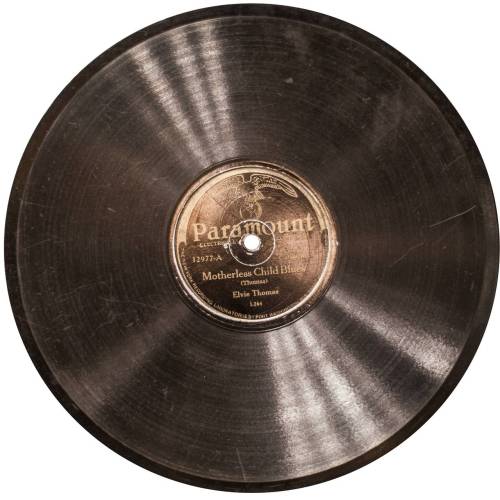
Geeshie Wiley and Elvie Thomas, “Last Kind Word Blues”:
Geeshie Wiley and Elvie Thomas, “Motherless Child Blues”: (1930)
Geeshie Wiley and Elvie Thomas, “Skinny Leg Blues”:
Geeshie Wiley and Elvie Thomas,” Pick Poor Robin Clean”:
Geeshie Wiley and Elvie Thomas, “Come On Over To My House”:
Geeshie Wiley and Elvie Thomas, “Eagles On A Half”:
-– A Days of the Crazy-Wild blog post: sounds, visuals and/or news –
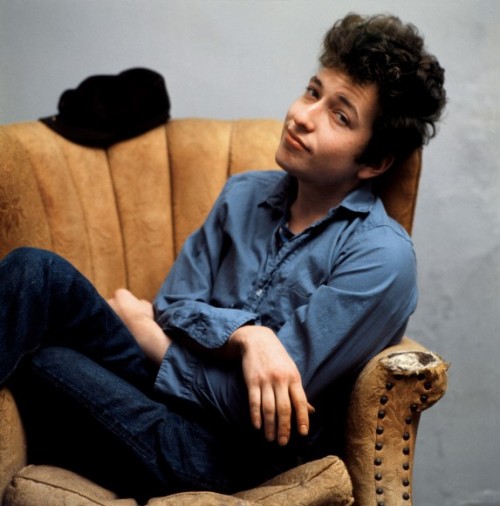
Fifty-two years ago, Bob Dylan appeared at Gerde’s Folk City. He’d been playing there since 1961 when, on April 11, he played Gerde’s for the first time.
What’s important about the April 16, 1962 gig is that some of it was recorded, and the recordings are tremendous. They’re great in and of themselves, but it’s also fascinating to get another earful of an artist in transition. And with Bob Dylan, he’s always in transition.
These songs appeared on an official album released by Sony two years ago. They’re on the The 50th Anniversary Collection: The Copyright Extension Collection, Volume 1. Of course that was released as a very limited edition so that Sony could prevent the recordings from entering the public domain in Europe.
Anyway, enjoy.
“Honey, Just Allow Me One More Chance”:
“Talkin’ New York”:
“Corrina, Corrina”:
“Deep Ellum Blues”:
“Blowin’ in the Wind”:
-– A Days of the Crazy-Wild blog post: sounds, visuals and/or news –

Here’s Bruce Springsteen & E Street Band performing “The River” last night at Barclays Center
Brooklyn, NY.
-– A Days of the Crazy-Wild blog post: sounds, visuals and/or news –

Conor Oberst’s Upside-Down Mountain will be released on May 19, 2014.
Meanwhile Oberst performed seven songs from the album at WNYC’s Greene Space.
Check them out.
“Time Forgot”:
“Double Life”:
“Night at Lake Unknown”:
“Lonely at the Top”:
“You Are Your Mother’s Child”:
“Common Knowledge”:
“Hundreds of Ways”:
-– A Days of the Crazy-Wild blog post: sounds, visuals and/or news –
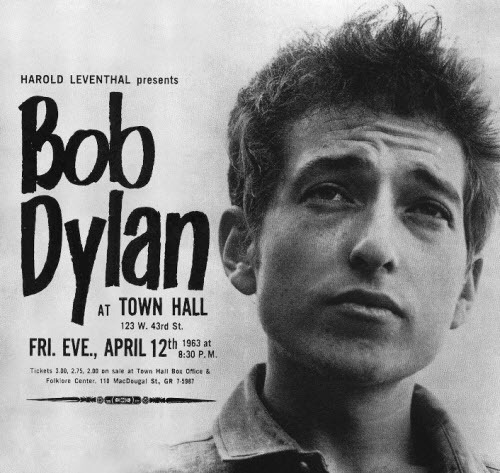
Fifty-one years ago, when Bob Dylan performed at Town Hall in New York on April 12, 1963, he blew a lot of people’s minds, and we’re still reeling from this amazing event.
I could write pages on this concert, but all you gotta do is hear it, and you’ll get it.
The concert — 23 songs plus a poem — was incredible. I’ve previously posted some of the songs, but today I’ve got the entire concert. All the songs and the poem.
This is worth your time!
Town Hall, April 12, 1963:
1 Ramblin’ Down Thru The World
2 Bob Dylan’s Dream
3 Talkin’ New York
4 Ballad Of Hollis Brown
5 Walls Of Red Wing
6 All Over You
7 Talking John Birch Paranoid Blues
8 Boots Of Spanish Leather
9 Hero Blues
10 Blowin’ In The Wind
11 John Brown
12 Tomorrow Is A Long Time
13 A Hard Rain’s A-Gonna Fall
14 Dusty Old Fairgrounds
15 Who Killed Davey Moore?
16 Seven Curses
17 Highway 51
18 Pretty Peggy-O
19 Bob Dylan’s New Orlean’s Rag
20 Don’t Think Thrice, It’s All Right
21 Hiding Too Long
22 With God On Our Side
23 Masters Of War
24 Last Thoughts On Woody Guthrie
-– A Days of the Crazy-Wild blog post: sounds, visuals and/or news –

In 1977, my wife Leslie and I interviewed Jesse Winchester. I was a young music critic at the time, and Leslie and I were freelancing for underground publications including the Berkeley Barb, the San Francisco Bay Guardian, as well as some local and national magazines.
I found the article we wrote when I was going through years of stories for a collection of my music journalism that I’m putting together. With Jesse’s passing this morning, I want to share it with those who, like I, have appreciated his music for many, many years, and for those who are hearing it for the first time today.
So here’s the article, along with a few of Jesse’s songs:
A Little Bit of Dixie in the Cool Blue North
By Leslie & Michael Goldberg
If there was ever a man who seemed predestined to be a singer/songwriter/musician it is draft-resister-turned-Canadian-citizen Jesse Winchester. His career has been riddled by strange lurches of fate. The strangest lurch of all, of course, was the Vietnam War.
Rather than be drafted, Winchester, at age 22, fled to Canada in January of 1967, arriving with only two hundred dollars in his pocket.
“I had never considered music as a profession until I was forced to,” reflected Winchester between sets in the dark, smokey Boarding House bar [in San Francisco] last week. “I tried to find a straight job when I moved to Canada in some kind of business or something. I wanted to show good faith to the Canadian government, that I was not going to be a ward of the state. So I looked around for a legitimate job and couldn’t find one.
“People heard my southern accent and wanted to know what I was doing there and when I told them they were kind of wary of hiring me. So music was the only thing I knew how to do that I knew I could make a living at. So I was pretty well forced into it.”
“The Brand New Tennessee Waltz” (produced by Robbie Robertson):
He hooked up with a Canadian rock and roll band, Les Astronauts. During the following two years Jesse was in and out of bands, writing songs and building a following in the clubs and bars of Montreal. Through fortunate circumstances Jesse happened to meet up with The Band’s Robbie Robertson.
“Robbie was a friend of a friend of the girl I was living with. He and I met in the basement of a church in Ottawa where I was working on a tape. So this friend I was speaking of brought Robbie down and he had just put out Music From Big Pink with his band So I was very impressed by him and very thrilled to meet him,” said Jesse, a softspoken, exceedingly polite man who neither drinks nor smokes.
“Robbie liked what we’d been doing. He decided we’d make a demo tape in a real studio and he would take it to Albert Grossman (Dylan’s former manager) which is what happened.”
ApparentIy Robertson, a Canadian himself with a fascination with the South, was much taken by Jesse’s heartfelt songs about his homeland.
“Black Dog” (produced by Robbie Robertson):
The Winchester family has a strong southern heritage which is evoked in many of Jesse’s songs. Jesse was born on May 17, 1944 in Shreveport, Louisiana. The Winchesters are connected to the Robert E. Lee family and Jesse’s fifth great – grandfather helped Andrew Jackson found Memphis. His grandfather gave the funeral oration at Memphis jazzman W. C. Handy’s funeral.
Jesse’s father was the first “radical” of the family. He hated World War II and initially rejected a legal career to work the land. “He was one of the original hippies in the late Forties,” said Winchester. “He took up farming to get closer to the land.”
Although Jesse insists on his Canadian loyalty, he is proud of the South and has turned to it for his songwriting inspira-tion. Perhaps his exile in Canada has fueled the fires of this great passion.
“I think I hear a noisy-old John Deer/ In a field specked with dirty cotton lint/ And below the field runs a little shady creek/And there you’ll find the cool green leaves of mint/ Mississippi you’re on my mind/ Mississippi you’re on my mind/ Oh, Mississippi you’re on, my mind.” — “Mississippi You’re On My Mind”
“Mississippi You’re On My Mind”:
Jesse Winchester is one of the best contemporary songwriters working today. Not only do songs like “Mississippi, You’re On My Mind” evoke crystal clear images and moods of the South, but his good natured songs about relationships transcend the merely personal to the universal.
“I’m no good company/ I guess that’s true/ I like my silence/ Like I love you/ But if you feel like talkin’/ Talk away/ I’m gonna hang on/ Every word you say.” — “Every Word You Say”
Although many of the songs on Jesse’s five albums are about the South, until recently he has had no way to tour the U.S. and thus expose his music. Despite highly favorable reviews of each album, starting with his first (and only) Robbie Robertson produced album, Jesse Winchester, right up to his latest, Nothing But a Breeze, Jesse was unable to sell many records. He lived off club work and the royalties that came in from versions of his songs, “Brand New Tennessee Waltz,” “Isn’t That So,” “‘Yankee Lady” and “Mississippi, You’re On My· Mind” recorded by better known artists including Joan Baez, Jimmy Buffett, the Everly Brothers and even Wilson Pickett. Carter’s amnesty was welcomed because it allowed Jesse to tour the U.S. for the first time and promote his records.
We caught two of Winchester’s many sold out shows at the Boarding House. Drawing from each of his albums, Winchester presented a powerful, cohesive performance that far surpassed his best recorded efforts. His was one of the best club appearances so far this year. The Midnight Bus, his terrific band, glided easily from Nashville-style country to funky blues and moody ballads.
“Biloxi”:
Winchester’s sense of humor, a side seldom revealed on record, balanced the serious tone of many of the songs. For a new tune, “Rhumba Man,” Jesse danced, bopped and gestured comically as he sang about the joys of doing the Rhumba.
Winchester’s tour through the U.S. has been wildly successful. Still, he feels uncomfortable with all the fanfare and his notoriety as the draft-dodging songwriter. “My feelings are ambivalent,” he admitted freely. “On one hand I know that a lot of publicity has come to me because of it and on the other hand I think it would be just in the worst possible taste to purposely capitalize on something like that. So I’m benefiting from an ugly thing. And it’s a fine, delicate line to tread and I just have to try extra hard to do the right thing, say the right thing all the time, be as forthright as I can on the subject.
“I’d like to be able to forget the whole thing. But on the other hand I can’t pretend it didn’t happen. I just have to play it by ear and do the best I can. My job at the moment is to play the best music I can and I think if I do that, eventually it will be the thing that will stand. I really have to concentrate on that and let the political stuff do what it will.”
Jesse, his French-Canadian wife Leslie, 26, and their two children, James, 5 and Alice, 2, make Montreal their home Jesse became a Canadian citizen in 1973.
“Yankee Lady”:
“I feel that can’t come back to the U.S. to live because I made a decision to move to Canada and not away from the United States. So I’m doing my best to be a good Canadian. I have nothing against the United States. I love the United State and always will. But my loyalties lie with Canada now. I’m very grateful to the country and I want to be a good citizen.”
When asked what he meant by the key lines of the title track of his new album “Me, I want to live with my feet in Dixie/ And my head in the cool blue North, Jesse explained, “It’s just talking about how people want to have their cake all eat it too. You kinda want both sides of things and it’s hard to make up your mind, that’s all.”
Elvis Costello, Jesse Winchester & Sheryl Crow play “Payday”:
-– A Days of the Crazy-Wild blog post: sounds, visuals and/or news –